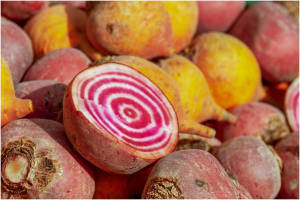Ever wondered what kind of nutrients are available in beets? In this article, I give you a comprehensive beetroot vitamins list that helps keep your body healthy.
There are many nutrients and vitamins in beets, but be careful about the amount of sugar in them. You will find iron, Vitamin B9, and also Vitamin C along with other vitamins and minerals.
What are the nutrients and vitamins ins beets?

Beets contain nutrients that benefit most of our bodily functions. Some of the core vitamins and minerals in beets are:
- Manganese
- Iron
- Vitamin B9
- Vitamin C
- Potassium
- Betanin
- Inorganic nitrate
- Vulgaxanthin
Manganese
Manganese is a vital nutrient found in veggies and fruits. Beets have a lot of manganese which directly promotes bone health. This mineral is essential in the development of bones. When combined with other nutrients, manganese helps in maintaining a healthy bone mineral density.
Iron
If you have always wondered does beetroot contain iron, you are not alone. I discovered beetroot source of iron and found my replacement for pan-fried liver. Iron is vital for your body to keep diseases like anemia at bay. Beets iron also helps with boosting the body immune system function. The iron content in beetroot juice also helps in boosting hemoglobin, reducing fatigue, and improve concentration. Iron improves your sleep pattern as well.
Vitamin B9
Vitamin B9 or Folate assists in the formation of red blood cells. It is also a core nutrient in the synthesis of DNA which determines our human attributes. Combined with vitamin C, vitamin B9 promotes gut health and helps the body absorb proteins better. If you are into fitness, red beet vitamins can help you bulk up faster.
Vitamin C is a common ingredient in our meals. It helps us fight the common cold by boosting our immune system. As a water-soluble vitamin, vitamin C lowers stroke by 42%. Vitamin C is rich in antioxidants which slow down the aging process. This vitamin also helps in reducing inflammation and staving off cardiovascular disease.
Potassium
Potassium is also one of the vitamins and minerals in beets. It reduces the risk of stroke and hypertension. Increased intake of potassium also promotes excretion of excess sodium via the urine. Potassium is also good for heart health.
Betanin
Betanin is the food additive that gives beet its red hue. As one of the beet juice vitamins, Betanin has antioxidants effects on the body. It promotes skin health and reduces the rise of free radicals in the blood. Just like other beetroot vitamins, Betanin also helps in regulating blood pressure.
Inorganic nitrate
Nitrates are important because they carry similar beets vitamins health benefits. Nitrates convert into nitric oxide in the blood. Nitric oxide helps in dilating blood vessels which improves blood flow in the body. Improved blood flow can help reduce the onset of erectile dysfunction. Nitric oxide reduces muscle soreness and boosts endurance when exercising.
Vulgaxanthin
Like Betanin, Vulgaxanthin is responsible for the yellow tinge in beetroots. It is plenty in yellow beets. Vulgaxanthin is a phytonutrient that helps in reducing inflammation in the body. It inhibits the enzymes that trigger inflammation in body cells. This helps to reduce body pain and the side effects of ailments like cardiovascular disease.
How can you get the most of the vitamins and nutrients in beets?
By consuming beets raw, you are already enjoying beets benefits iron and other minerals. But did you know it is possible to amplify these benefits by getting rid of unwanted beet ingredients? One of the things to eliminate from beet is excess sugar.
The sugar in beets increase calories you do not need. You can eliminate them by fermenting your beets. You only need to wash and chop the beets then submerge them in a jar filled with water. Seal the jar and let the beets sit for 2 to 4 weeks.
This fermentation process releases bacteria in beets that feed on the sugar. Pickling is another method of fermenting beets to reduce sugar content. I enjoy the tangy flavor I achieve from my fermented beets.
Are there any health risks of consuming Beets?
As you enjoy the vitamins in beetroot juice, you should also be aware of the potential side effects. You can only suffer the side effects of beets of you consume it too much. Beetroot contains traces of oxalate which cause kidney stones. Betanin in beet also turns your urine to pink or red color. Some people may experience some stomach discomfort from consuming beetroot juice.
Conclusion
I hope I was as comprehensive as possible in revealing the vitamins and minerals in beets. I encourage you to ferment your beets to eliminate the excess sugar in them. Also, consult with a doctor before you start taking beet juice. Some people may have an adverse reaction to the beets.
FAQs
Are golden beets as healthy as red beets?
Beetroot has many variants and they all provide the same benefits. The only difference here is the color of the vegetable.
Raw or cooked beets, which is more beneficial?
Go for raw beets if you enjoy their sweet and crunchy taste. Though cooked beets are healthy, cooking lowers the nutrient intake of the beets.
Raw vs fermented beets, what’s the difference?
Fermented beets have lower sugar content. They also have a savory flavor compared to the sweet taste of raw beets.
Is beet juice good for the uric acid patient?
Beetroot reduces the inflammatory effects of uric acid. Combine it with carrot and cucumber juice to fully cure the symptoms of high uric acid.

